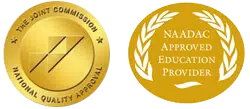Detox, or detoxification of addictive substances in the body, is the first step in addiction recovery. Once your body is free from the addictive substance, then you can start the work of recovery. Medically supervised detox can help ease the painful withdrawal symptoms from opioids, alcohol, benzodiazepines, and other narcotics. For people who have a severe addiction to benzos or alcohol, medical detox can significantly reduce the chances of deadly withdrawal complications.
What are the Benefits of Medical Detox?
Undergoing detox with medical care helps reduce the painful symptoms of withdrawal and prevent life-threatening complications, like seizures or a stroke. Many people keep using drugs or drinking to avoid withdrawal symptoms, like severe hangovers, shaking, or being “dope sick.” Easing the pain of withdrawal can increase the odds of successful withdrawal – the first few days of sobriety are among the riskiest for release.
In addition, most addiction treatment centers will not accept clients until they’ve detoxed and are clean. Once that’s done, you’re in a better place to therapeutically analyze your behavior patterns and explore your reasons for using them.
Symptoms of Withdrawl Can Be Serious if Not Medically Managed
The strain of detoxification on the body is significant. Many people addicted to drugs or alcohol may already be in poor health or have compromised organ systems. Heart and liver problems are common in addicts. During the detox phase, your body is put through the wringer, and you may have a negative reaction, like a seizure, heart palpitations, very high blood pressure, or hallucinations. These can be dangerous, sometimes deadly. The right medication reduces these symptoms and helps prevent a health emergency.
Getting medical assistance for detox isn’t a sign that you lack willpower or aren’t strong enough to “go cold turkey.” Rather, having a medically supervised detox is a smart choice to protect your health and reduce your chances of a relapse.
How Does Medically Supervised Detox Work?
Medical detox is performed in an inpatient clinical setting, usually a hospital or detox facility with advanced medical care. Clients are monitored by licensed nurses specializing in addiction around the clock. They watch for complications during detox and work with you to reduce your symptoms.
The first step in your detox is a medical assessment, including a drug and blood alcohol test, to determine what is in your system and how much. You’ll be given an IV with fluids and electrolytes and administered IV medication. The medication you’re given depends on what you’re detoxing from, and the amount varies according to the severity of your addiction, how long you’ve been using, and your height, weight, and gender.
The medications you’re given often block the opioid receptors in your brain to reduce cravings. Many people are also given anti-seizure medications, and you’ll receive medication for nausea and headaches. Nutrition and proper hydration are crucial to a healthy detox, so you’ll have plenty of water and meals. Expect to be very tired during this process as your body heals, so sleep as much as you need to.
Do You Need Detox and Addiction Therapy?
If you’re concerned about the effects of a drug or alcohol addiction on your life, we can help. The dangers and discomfort of drug and alcohol withdrawal can be alleviated through medically supervised detox. Baystate Recovery Center partners with qualified medical detox facilities in our area, and once you’ve completed detox, you can begin one of our evidenced-based treatment programs. Contact us today for a confidential evaluation of your treatment needs.
Baystate Recovery Center, a clinically Infused 12-Step Treatment Center for Drug and Alcohol Addiction, was founded by two partners in addiction treatment services, John Checchi and Michael Wilson.



